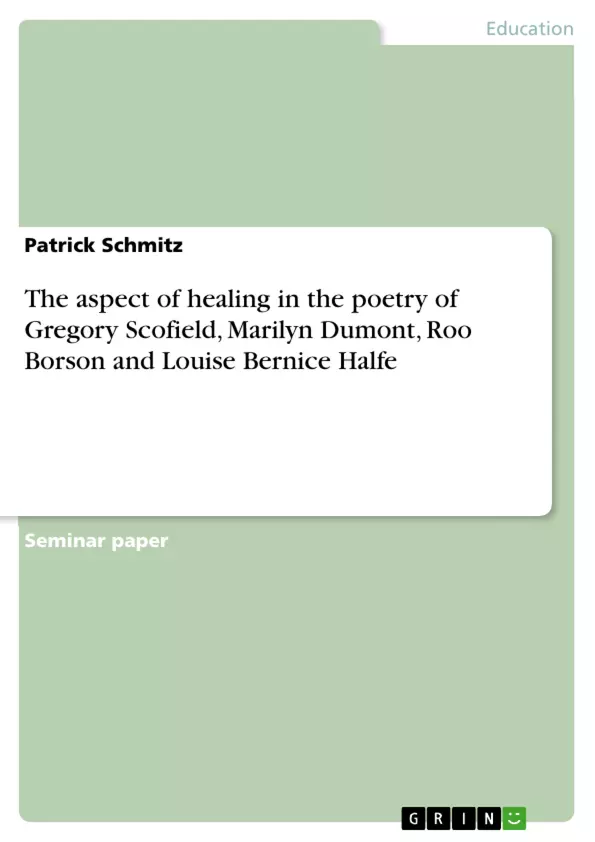I write to heal” (Scofield Gathering 821), “writing became my medicine” (Halfe Bear 1272), “be healed through creative expression” (Payne 1353), “he writes us weapons and shields, weaves us blankets” (Driskill 2224), “Indigenous writers (…) narrate Indigenous experiences under colonialism in an effort to heal” (Episkenew 15). Native literature – be it a poem, a drama, a novel or research literature – brims over with allusions as to why Native writers mostly intend to write, to compose and to publish: to tell the truth, to spread their culture, to strengthen their identity, to empower and find themselves, to unite, to change, to resist, to reanimate. But nearly every reason and method to do so ultimately starts and ends with an attempt to heal. Many Native and Métis authors for example write about their own lives, experiences and emotions – say about the loss of a beloved person – to cure their own “soul wound[s]” (Episkenew 5). Some process the history or widespread problems of many Natives to treat the wounds of their whole community caused by alcohol, rape and exclusion. They attempt to heal “injuries that colonialism and racism had inflicted” (1) e.g. by telling the Natives’ history from their own perspective, a ‘history from below’ in the manner of speaking. In this term-paper, I will concentrate on this very act of healing and therefore also on the contents of their poems rather than on their form. I want to examine different works with a particular focus on the wounds, which demand to be healed, within them and I want to present the ‘patients’ that suffer from these injuries – i.e. the people that are to be cured. In doing so, I will analyse the works of Gregory Scofield, Marilyn Dumont, Louise Bernice Halfe and Ruth ‘Roo’ Borson. Which issues do these poets attempt to process by writing about them?
Inhaltsverzeichnis (Table of Contents)
- Introduction
- Analysis
- Gregory Scofield
- Marilyn Dumont
- Roo Borson
- Louise Bernice Halfe
- Conclusion
- Bibliography
Zielsetzung und Themenschwerpunkte (Objectives and Key Themes)
This term paper examines the act of healing in the poetry of Gregory Scofield, Marilyn Dumont, Louise Bernice Halfe, and Ruth 'Roo' Borson. It focuses on the wounds that these poets attempt to process through their writing, exploring the individuals and communities affected by these injuries. The paper investigates whether these authors primarily aim to heal themselves or the wounds of their entire communities, and whether their experiences of mixed race or Indigenous identity influence their poetic expression. Finally, the paper explores the distinct methods employed by each author to address these issues, such as code-switching or irony. Key themes include:- Healing and Trauma: Exploring the impact of colonialism, racism, and personal experiences of violence, abuse, and loss on Native communities and individuals.
- Identity and Belonging: Investigating the complex interplay of Indigenous, mixed race, and LGBTQ+ identities within the context of colonial history and societal expectations.
- Cultural Expression and Resistance: Examining how Native writers utilize language, storytelling, and poetic form to reclaim their narratives, challenge stereotypes, and resist oppressive forces.
- Societal Healing: Analyzing how these poets advocate for social change and address widespread issues such as addiction, abuse, and cultural loss within Native communities.
- Poetic Methods and Techniques: Exploring the use of code-switching, irony, and other poetic devices to convey complex themes and experiences.
Zusammenfassung der Kapitel (Chapter Summaries)
The introduction outlines the central theme of healing in Native literature, emphasizing the desire of writers to tell their truth, empower themselves, and address the collective trauma of colonialism. It introduces the four poets – Gregory Scofield, Marilyn Dumont, Louise Bernice Halfe, and Ruth 'Roo' Borson – and highlights the specific issues each poet addresses through their work.
The chapter on Gregory Scofield examines his life story, marked by violence and drug abuse, and its influence on his poetry. It explores how he uses his writing to address both personal wounds and broader societal issues, such as the abuse of Native children in boarding schools. It further analyzes his use of irony to challenge stereotypes and address the impact of alcohol addiction on Native communities.
Schlüsselwörter (Keywords)
This term paper focuses on key themes of healing, trauma, identity, cultural expression, resistance, and societal healing within the context of Native literature. The primary focus is on the poetry of Gregory Scofield, Marilyn Dumont, Louise Bernice Halfe, and Ruth 'Roo' Borson, examining their individual experiences, poetic techniques, and contributions to a broader discourse of Indigenous voice and resilience. The paper also explores concepts like code-switching, irony, mixed race identity, and the impact of colonialism and racism on Native communities.Frequently Asked Questions
Why do Native and Métis authors often state that they "write to heal"?
Many writers use literature as "medicine" to process personal trauma, the "soul wound" of colonialism, and the injuries inflicted by racism and exclusion.
Which poets are analyzed in this study regarding the aspect of healing?
The study focuses on the works of Gregory Scofield, Marilyn Dumont, Louise Bernice Halfe, and Ruth ‘Roo’ Borson.
What specific issues does Gregory Scofield address in his poetry?
Scofield processes personal experiences of violence and drug abuse, as well as collective trauma like the abuse of Native children in boarding schools.
How does the concept of "history from below" relate to Native literature?
Indigenous writers narrate their history from their own perspective to challenge colonial narratives and empower their communities through truth-telling.
What poetic techniques are used to convey these themes of healing?
The authors employ methods such as code-switching (using Indigenous languages), irony to challenge stereotypes, and powerful metaphors like "writing weapons and shields."
- Arbeit zitieren
- Patrick Schmitz (Autor:in), 2009, The aspect of healing in the poetry of Gregory Scofield, Marilyn Dumont, Roo Borson and Louise Bernice Halfe , München, GRIN Verlag, https://www.grin.com/document/190612



